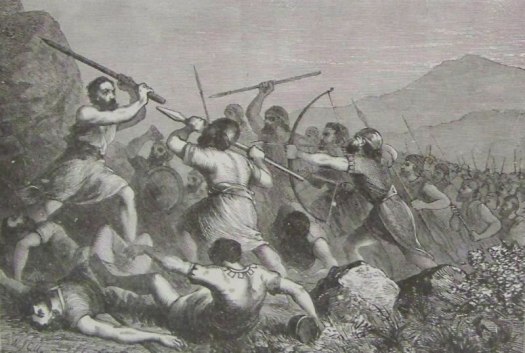
When it comes to guerrilla warfare, the first person mentioned in the Bible who fits the narrative was a man by the name of Shamgar. But who was Shamgar? The Bible mentions little about him. What is known is that he was the son of Anath. However, the name Shamgar is not exactly Hebrew. Anath is possibly his mother’s name; another possibility is that he worshipped the Canaanite war goddess known as Anath. This would explain his being a professional soldier. Another clue that provides further support is his weapon of choice, an ox goad. Historian Raphael Patai mentions that the “ox-goad Shamgar used as a weapon reminds us of the two bludgeons, Ayamur (“Driver”) and Yagrush (“Chaser”), which Baal, Anath’s brother and lover, used to defeat his arch-enemy Yamm.” With his weapon measuring roughly eight feet in length with a metal tip, he took the Philistines head on and slew “six hundred men.” But a question remains. Why did Shamgar attack the Philistines?
There are many possible explanations to this Biblical figure. When reading the passage in Judges 3:31, one could say Shamgar was nothing more than a disgruntled Canaanite farmer who took on the Philistines alone. While this is possible, the likelihood is that Shamgar was a Canaanite mercenary hired by an Israelite tribe to take care of the Philistine problem. Military Historian Richard Gabriel points this out as “the inability of the Israelite tribes during the period of the Judges to manage their own military affairs effectively.” However, the other possibility is that he was a mercenary leader hired by the Egyptians to lead his band of warriors to combat the Philistine invasion. Another theory is that he was not a mercenary, but a Canaanite captain leading his band of troops in an attempt to take advantage of the aftermath the Sea Peoples left behind in southern Canaan and retake former possessions from the Egyptians.
While it is doubtful that Shamgar fought the Philistines alone, the other theories mentioned make sense from a military perspective. What is important to the story is that he did engage an adversary of Israel, which the Israelites obviously could not engage. Because of his limited success against the Philistines, which physically did little to deter them, the effect it had on the Israelites, at least the author of the book of Judges, saw to it that Shamgar, a non-Israelite, would be listed as a judge of Israel.
By Cam Rea
References
Judges 3:31.
Bromiley, Geoffrey W. The International Standard Bible Encyclopedia. Volume 4 – Q-Z . Grand Rapids, MI: William B. Eerdmans, 1988.
Clendenen, E. Ray and Jeremy Royal Howard. The Holman Illustrated Bible Commentary. Nashville: TN: Holman Reference, 2015.
Gabriel, Richard A. The Military History of Ancient Israel. Westport: Praeger, 2003.
Keener, Craig S. The IVP Bible Background Commentary: New Testament . Downers Grove, IL: InterVarsity Press, 2014.
Patai, Raphael. The Hebrew Goddess . Detroit, MI: Wayne State Univ. Press, 1998.
Sasson, Jack M. Judges 1-12: A New Translation with Introduction and Commentary. New Haven, CT: Yale University Press, 2014.
Smith, William. Smith’s Bible Dictionary. Westwood, NJ: Revell, 1967.
